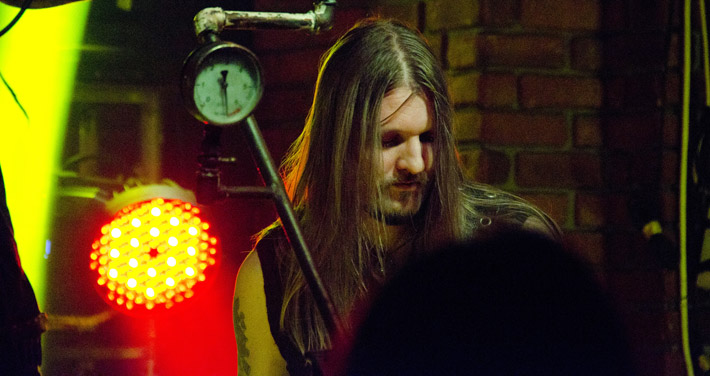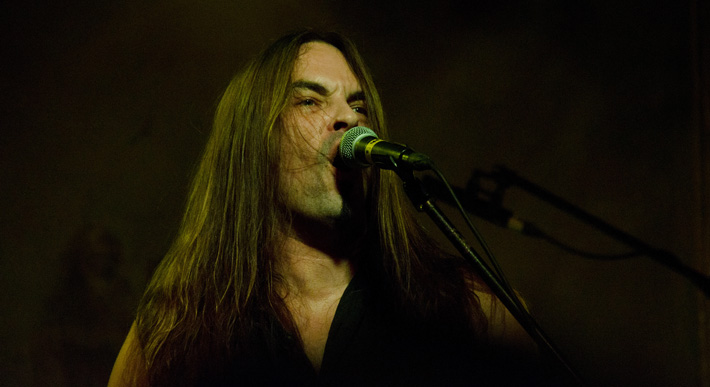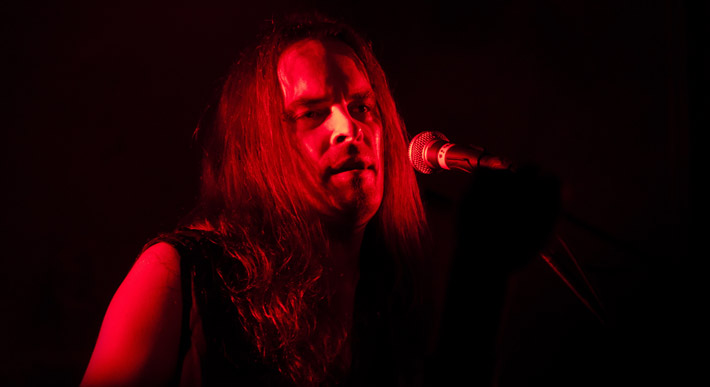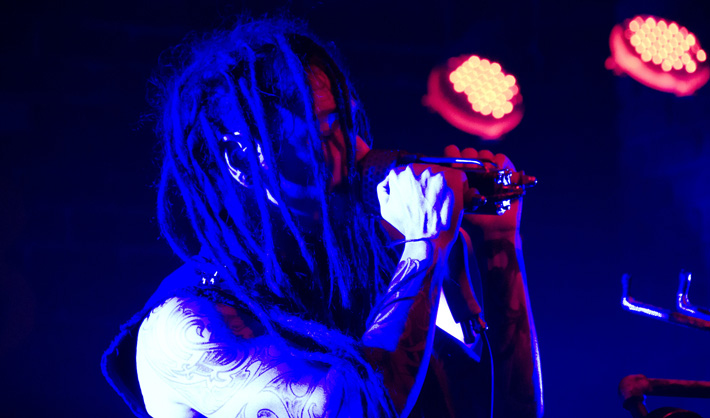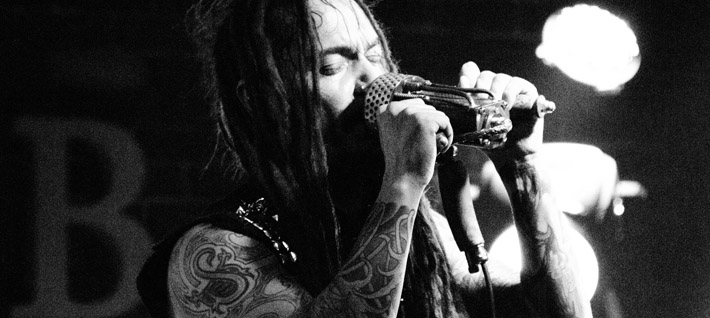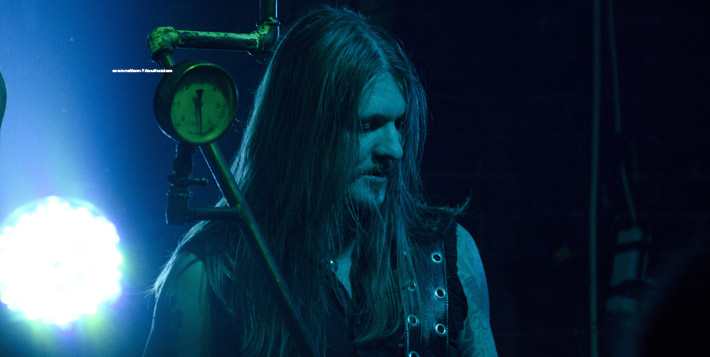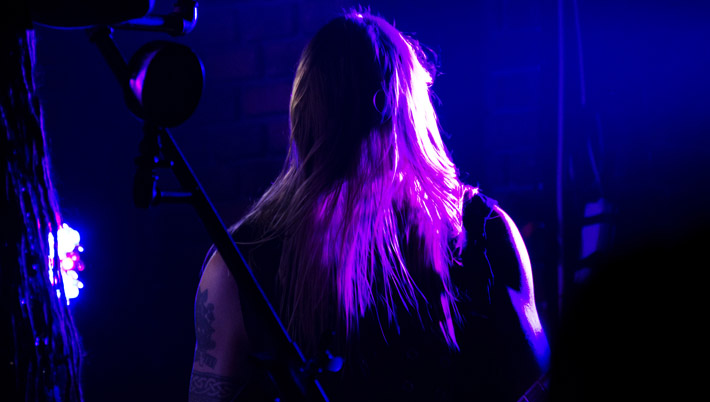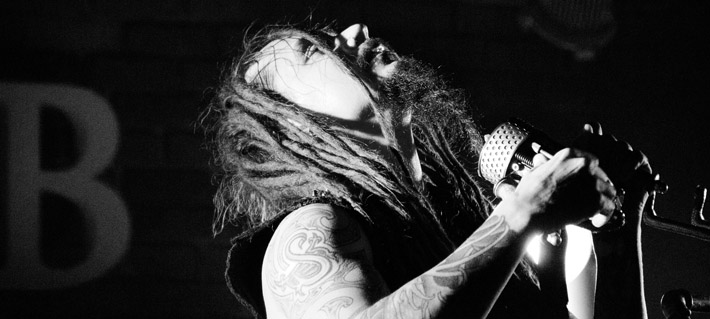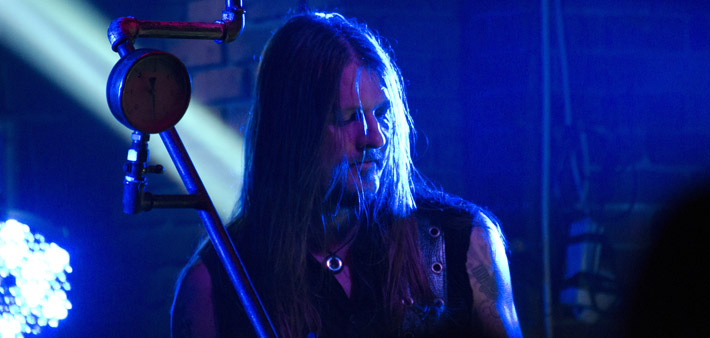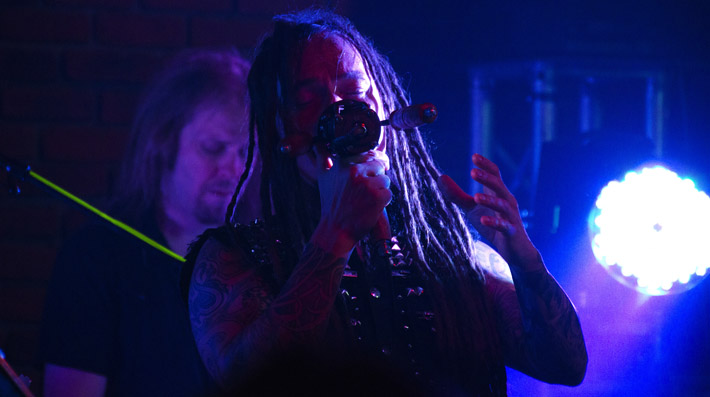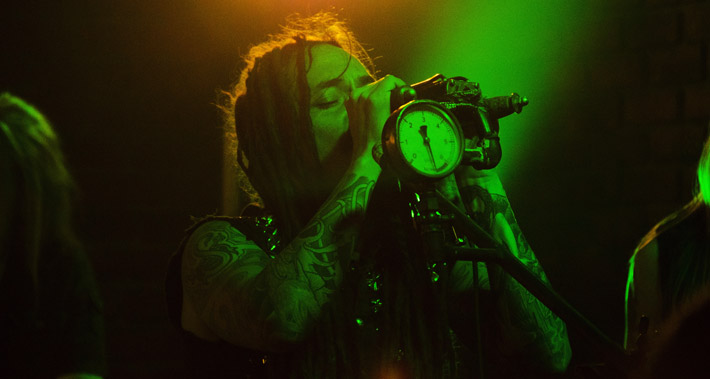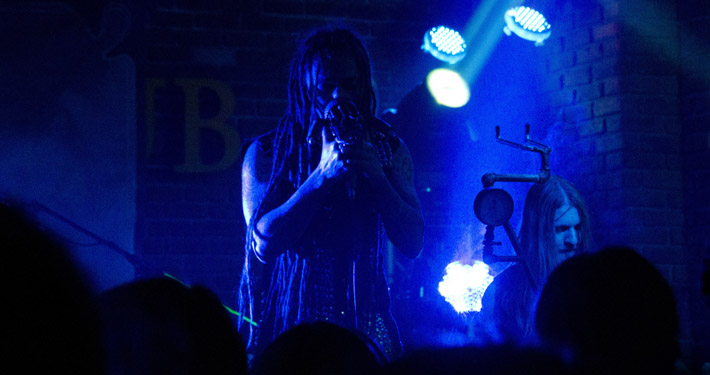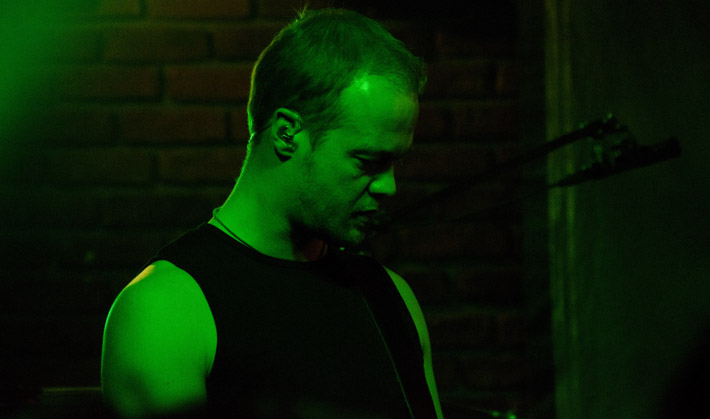
Due to our enormous influence on the metal scene, the uncanny negotiating abilities of our own Alex, and the kindness of Markus Jacob from Nuclear Blast, I’ve had the chance to bust my proverbial cherry and take my first interview ever. As luck would have it, I got to talk with one of the bands I like very much: Amorphis.
After stalking their tour bus and attracting several suspicious looks I approached them, taking advantage of the fact that they were basking in the late November sun and that their tour manager assured them I was harmless (a big thank you to Mr. Gerrit Wissdorf!). I warned them about DoM being an ubercool metal humor site, only to be warned back: “We don’t laugh. We are people from the dark North”. “Yep, I know, and you also don’t talk before breakfast”, I quipped. Witty comeback, huh.
Once all the kidding around finished and my persona was firmly established as a dork, we headed to the tour bus, where Tomi Joutsen and Esa Holopainen were more than accommodating hosts.
So, here goes the interview. I still wonder how tough these guys are, since they heroically resisted my assault of lame ass questions…
One more thing, all photos were taken by yours truly during the gig, while trying hard not to bust my camera with my own metal frolicking. You can click them for a larger version (that’s what she said!)
Dose of Metal: Your last album, “The Beginning of Times”, sounds very much like a continuation of “Skyforger”, both musically and lyrically. Is this the track you will stay on, musically, or do you envision some surprises in the future?
Esa Holopainen: It’s really hard to tell what the future brings, but the lyrical concept is most likely to be linked with Kalevala, at least in some way. It would be hard to think we could do an album that is not connected to Kalevala, at any point. Music wise, I think it’s a quite straight continuation of the last album. Music is something we might take some challenges in the future, perhaps trying a different producer or some different kind of sounds. There’s no limit, really, to what we might and can do.
Tomi Joutsen: I don’t know, it’s really hard to say, because I don’t know when we are going to release the next album. I know some of the band members have some rough ideas or maybe a song or two, but we haven’t talked anything about the new album. Maybe we’ll start practicing new songs the next year, and release a new album probably sometime in 2012. I really look forward to it, it’s always really nice to release a new album and add new songs to the set list.
DoM: I asked you that because, at some point, you took a sidestep from your general musical direction (I was talking about their 2001 album, “Am Universum”), but you came back stronger, if I may say so.
EH: *smiles* Mmhm.
DoM: The vocals for the last four albums were arranged and produced by Nightwish bass player and Tarot frontman Marco Hietala. Is there some kind of magic between you guys?
TJ: It’s really easy to work with Marco Hietala because he’s a really talented singer, he has lots of ideas and he’s really fast. I’m really thankful that I had the chance to work with him. He’s one of the best singers in Finland and he has been in the business for many years, so it’s always a pleasure to work with him. This time, we worked in his hometown, Kuopio, which is a couple of hundred kilometers away from Helsinki, and so it was like a big adventure for me. It was the first time I recorded for an album in that city and it was really quite a nice experience. It was a very intense two weeks we spent there and it was snowing all the time, so it was a perfect match for the music. I always wanted to work with him, he’s a real professional and, as I said, really talented. He’s also really talented in English, which is very important, so he’s a big help.
DoM: Your profile on the band’s site says that your favorite character in Kalevala is Tuonelan Joutsen. Does this have anything to do with your last name, or it’s only because of the character?
TJ: It’s because my last name is Joutsen, which means “swan”, so it’s like a joke, in a way.
EH: Humorist! *laughs*
TJ: Yeah, yeah, really funny.
DoM: Speaking of Kalevala, it has been the main source of inspiration for your music and lyrical content. Why did you choose not to follow the more beaten path of other metal bands, i.e. Satanism and other dark stuff?
EH: I think that those are subjects that are really easy to write lyrics about. We chose Kalevala because it represents the identity of the band, and I think it would be ridiculous to start writing about Satan at this point.
TJ: Like “fuck Väinämöinen” *laughs* (Väinämöinen is the central hero of their last album)
EH: Yeah, “fuck Väinämöinen, let’s praise Satan”, right. *laughs*
DoM: It is my impression that Finnish bands are, for the most part, somewhat more melodic in their approach to metal than, say, their Swedish or Norwegian counterparts. Some examples would be you, Stratovarius, Apocalyptica, even Nightwish, even though our readers will probably tear me a new one for these comparisons. Am I right? And if I am, why do you think it’s like that?
EH: As you said, there are a lot of Finnish bands that base their music on melodies and melody is important to them, but I think those who do it are the most popular ones. Of course there are lots of more underground bands and not that well-known bands that are doing a more pure death metal or metal music in general. Regarding your question, I think it’s much because melodic music is more popular, and melodic metal bands tend to stand out more easily. It’s pretty hard to say why. Perhaps people want something else from the music, not just a couple of riffs.
TJ: One reason is that, for example, the Norway black metal scene is huge, and that’s the reason there are so many black metal bands in Norway. Of course, we have lots of black metal bands in Finland also, but the scene is not so big and we don’t have any big black metal bands. Black metal is not so melodic, it’s brutal… I don’t know, maybe we are so melodic because our music is based on folk music, which has influenced us from the beginning. I don’t think we have so much in common with Stratovarius or Apocalyptica, I think we are totally different, but we’re still melodic in a way.
DoM: Your vocal range could easily allow you to sing pretty much everything, from the most brutal stuff to highly emotional clean tracks.
EH: Yeah, It’s a very good thing for the band that Tomi can handle both really well. It gives much more opportunities and layers to our music.
DoM: Your lyrics are written in English by Pekka Kainulainen. Is it easy to relate what you sing when following something not written by you?
TJ: Actually, they are written in Finnish by Pekka and translated by a friend of mine, Erkki Virta. It’s not a problem for me, because I can’t write any lyrics. If I write them, it’s total shit, so it would be totally stupid to spoil good music with shitty lyrics. It’s always been like that, I always sang someone else’s lyrics, so I’m really used to it.
DoM: As far as we know, you only recorded one song in Finnish, a cover of “Kuusamo”. Since you are quite well known now, do you think there will be more songs like that? Personally I find Finnish quite a musically pleasant language, and perhaps it will lend a little something extra, who knows…
TJ: We have some words, here and there, and I think that’s enough. Ten years ago, there were no bands in Finland to use Finnish in singing, but nowadays there are lots of them, so it’s not so exotic anymore. I don’t see any reason to do that.
EH: Hm. Yeah. I agree. *laughs*

DoM: Which venues do you enjoy most playing at, large open air festivals or small gigs in clubs? Why?
EH: I like club shows. You get a good contact with the audience. This one tonight is a very tiny place, I don’t know if it’s a little too tiny for my taste, but still, in general, I like clubs. The atmosphere is different than, say, big festivals, where at the end of the day you just play with your bandmates and the audience is somewhere far, ten meters away, so it’s a bit weird.
TJ: Well, I think it depends. It’s been a lot of great open air festivals we have played. If the festival is big enough, when you have thousands of people, it’s night time, you have nice lights and a good atmosphere, it feels almost like heaven. The feeling is incredible. But I think you can find the same feeling in a small club, because it’s really sweaty and really intense, you can almost smell the audience. *laughs*
EH: Or they could smell you. *laughs*
TJ: Sometimes if you’re playing at a huge festival and it’s afternoon, and the audience is far away, it just feels like playing only with your friends.
EH: But good metal festivals are great. As Tomi said, at night, when you get good lights and a good show, and you see the people going nuts, it’s great.
TJ: A couple of years ago we played at a festival in Estonia. It was really beautiful, it was in the middle of the forest and it was dark, and they had really nice lights there… It was a great experience.
DoM: And which ones do you find more technically and musically challenging?
EH&TJ: Open air festivals, definitely.
TJ: You don’t really have enough time for the technical stuff.
EH: Yeah, a quick lights check and that’s about it.
DoM: Some say that creativity is closely linked to the consumption of certain substances and argue that some top artists have gone uninspired since coming clean off whatever they were on. Would you agree? Is that a requirement for creativity?
EH: I don’t think so. It’s really hard to say because alcohol is the only substance I take *laughs*, and if I’m hung over or drunk I can’t really work properly, my mind doesn’t work very clearly. As for writing songs, I think that inspiration can come at any point, at any time, and it really doesn’t need any substances. When we are rehearsing and thinking about the songs we’re rehearsing, we’re usually quite sober… except maybe a couple of guys. *both laugh*
TJ: I think that if you have some great ideas while under influence, they might not seem so great once you’re sober.
EH: You know, we have some ideas for the shows on this tour, and it’s usually after the show, when people party a little bit, that someone has a killer idea for the next day. Come next day, we’re like “O.K., fuck it”. *laughs*
DoM: 70,000 tons of metal. 40 metal bands on a cruise ship and you too will be on it in January 2012. How do you think it works? Isn’t it kind of weird?
EH: *laughs* From what I’ve heard, it really works well. People act really nice there, and I don’t think they’ve ever had any problems. Everybody says it’s a good spirit over there.
TJ: I think it’s a great experience for the audience also, because they see lots of, like, rock stars hanging around, so it’s a quite small gap between audience and artists. I think, for example, that if Cannibal Corpse is playing and you can watch them from the pool with a Caipirinha in your hand, it’s not a bad idea. Or maybe the idea is so stupid it must work. *both laugh*
DoM: Kossu or Finlandia? If you drink vodka, that is…
EH: Uhhhh… I would say Finlandia.
TJ: Maybe Kossu.
DoM: Karhu or Heineken?
Both: Karhu, of course.
DoM: You have been interviewed quite a lot of times. Is there any question you would have wanted to be asked and never came up?
EH: Jesus… Nothing comes to mind right now.
TJ: Let me think… I don’t know. I think every possible question has been asked.
DoM: Along the same line, is there a question that you hope you will never be asked?
EH: Yes. “Tell us a brief history of the band”. *laughs* When the interviews start with that question, it’s always like… *rolls eyes* “…ughhh”. *laughs*
TJ: “Top ten metal bands”.
DoM: Thank you very much for your time, and have a killer show tonight.
…and they did. The small pub was filled to the brim, and the band played like there was no tomorrow. I won’t review the concert right now, other than saying that it was extremely solid and the atmosphere they created was great. They played songs ranging from their debut E.P. “The Karelian Isthmus” up to the latest album, and were tight as hell.
Personal highlight of the evening: “Crack in a Stone”.
Honorable mention: Leprous, one of the opening acts, for the incredible energy they brought onstage.
Last, but not least, it was the birthday of bass player Niclas Etelävuori on the very day of the gig. According to Tomi, he has just turned eighteen, so who are we to argue? Happy (a bit belated) birthday, Niclas!
And here are some of the photos I’ve taken:
Copyright info: All photos taken by Cosmin. You are allowed to use the images non-commercially in any way you want, but please credit us if you do.

